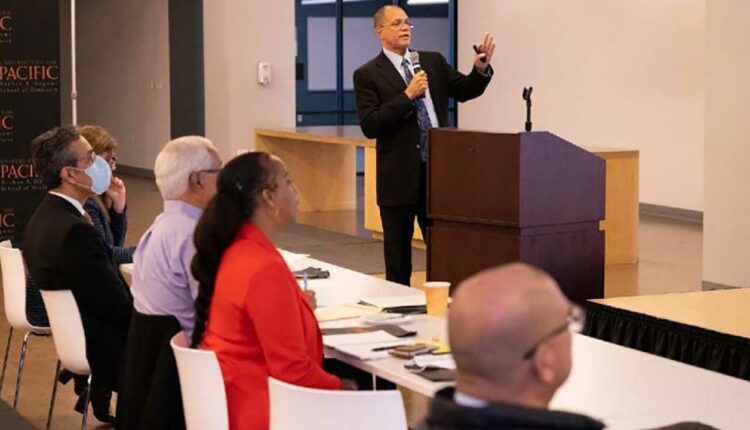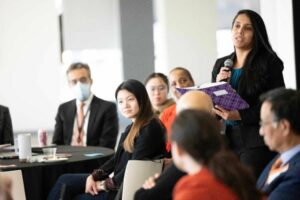
Symposium Explores Solutions to Inequities in Oral Healthcare
Health practitioners, educators, and leaders from across the country gathered in January at the University of the Pacific Arthur A. Dugoni School of Dentistry for the “Dentistry as Participant and Casualty of Racism and Bias in Medicine: Moving Toward Equity in Oral Health Care” symposium hosted by the Pacific Center for Equity in Oral Health Care. The gathering was among the first of its kind in dental education to explore the structural disparities in oral healthcare through the intersection of racism, ageism, ableism, sexism/gender bias, and other inequities.
“Our goal was to understand the history and consequences of systemic racism and bias in healthcare and engage participants in identifying strategies that could be used in dental practice, research, education, and healthcare policy to advance equity for all,” reports symposium organizer Elisa M. Chávez, DDS, director of the Pacific Center for Equity in Oral Health Care.

“Unfortunately, many patients experience barriers to receiving medical or dental care based on their race, age, sex, gender, disabilities, or socioeconomic status,” Chavez adds. “Poor oral health can also perpetuate bias and discrimination. The historical positioning of dentistry as an elective service made it OK for oral healthcare to be accessible to only those who could afford it. At the same time, this rhetoric devalued the importance of oral health to overall health and well-being, further limiting resources and opportunities to make oral healthcare accessible to those most in need.”
Speakers highlighted some of the inequities experienced across healthcare that are ground in racism or bias.
- In a recent nationwide survey of 714 physicians, only 40.7% were very confident in their ability to provide the same quality of care to patients with disabilities; just 56.5% strongly agreed they welcomed patients with disabilities into their practice; and 18.1% strongly agreed the healthcare system often treats these patients unfairly.
- A recent systematic review found that ageism led to significantly worse health outcomes in 95.5% of the studies and 74.0% of the 1,159 ageism-health associations examined. The analysis revealed the detrimental impact of ageism on older adults’ health occurs at both a structural and individual level across multiple continents.
- The racial mix of the dental workforce does not reflect the United States population, with Black and Hispanic dentists significantly underrepresented in the profession, according to recent data from the American Dental Association’s Health Policy Institute (HPI). The HPI also reports that while racial disparities in cost barriers to dental care have narrowed slightly for children, they have widened for adults and seniors.
Following the morning presentations, symposium attendees gathered for an afternoon of roundtable discussions and the formation of an action plan to close the gaps. Action items from the discussions will be compiled in a follow-up “call to action” report that will be posted on the Pacific Center’s website.

